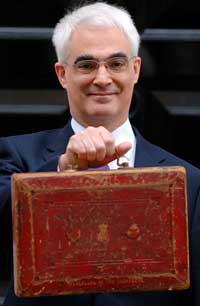Budget 2009 a mixed blessing for farming

An extension of agricultural property relief to the whole of the EU, a doubled rate of first-year capital allowances and an increase in fuel duty are the main points affecting agriculture in this week’s Budget.
BUDGET 2009 FOR FARMERS
Other key points:
|
Presenting his 2009 budget to a packed House of Commons on today (22 April), Chancellor of the Exchequer Alistair Darling acknowledged that the economy was going through the worst recession in 60 years.
But his emphasis was on supporting businesses and encouraging further investment, rather than imposing cutbacks. “You can grow your way out of recession,” he said, “but you cannot cut your way out.”
As such, his headline measures included increasing the top rate of tax to 50%, pledging £3bn additional funds for job creation and house building, and new investment in emerging technologies, such as biotechnology and renewable energy.
According to Carlton Collister of accountants Grant Thornton, one of the most significant developments for agriculture was the decision to extend agricultural property relief (APR) to the whole of the European Economic Area. “This is excellent news,” he said.
This important inheritance tax relief had been under threat because the EU Commission had criticised the government for limiting this to property held in the UK. It was feared that government would comply by scrapping the relief altogether. Instead, it is being extended to Europe and backdated to April 2003.
Less good news was the decision to increase the top rate of tax from 45% to 50% for those earning over £150,000. “Farmers should note that this includes rental and other savings income, as well as farm income, though it may be possible to mitigate this for farmers with fluctuating profits by averaging,” said Mr Collister.
Another key development in the Budget was the Chancellor’s decision to double the rate of first-year capital allowances, allowing people who invest in new plant and machinery to set 40% of the investment against tax.
Catherine Vickery, tax manager with Old Mill Rural Services explained that the first £50,000 of an investment could already be offset against tax under the Annual Investment Allowance. “The 40% capital allowance applies to investments above this amount, though it does not apply to integral features such as water systems and drains.”
All farming businesses, including sole traders, partnerships and companies, could benefit.
On fuel duty, the Chancellor has decided to increase the rates on road fuel by 2-/litre and red diesel by 0.38p/litre from 1 September. Further rises in fuel duty of 1p/litre have been inked in for each year from 2010 to 2013.
The move was condemned by Farmers Union of Wales president Gareth Vaughan who said it imposed an unfair burden on rural businesses. “The current economic climate, coupled with rising oil prices, has resulted in a significant increase in overheads for primary producers,” he said.

